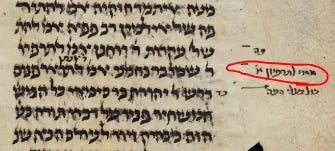Rabbi Yochanan's Medicine?
In Sanhedrin 100a, a curious statement by Rabbi Yochanan:
מַאי ״וְעָלֵהוּ לִתְרוּפָה״? רַבִּי יִצְחָק בַּר אֲבוּדִימִי וְרַב חִסְדָּא: חַד אָמַר, לְהַתִּיר פֶּה שֶׁל מַעְלָה; וְחַד אָמַר, לְהַתִּיר פֶּה שֶׁל מַטָּה.
§ Apropos the river that will emerge from the Holy of Holies, the Gemara asks: What is the meaning of the phrase: And its leaf for medicine [literufa]? Rabbi Yitzḥak bar Avudimi and Rav Ḥisda disagree. One says: This is an abbreviation for the phrase: To unlock the mouth [lehattir peh] that is above, i.e., the leaf heals the mute. And one says: That is the abbreviation, but it means to unlock the mouth that is below, a euphemism for healing the womb of a barren woman.
אִיתְּמַר נָמֵי: חִזְקִיָּה אָמַר לְהַתִּיר פֶּה אִילְּמִין, בַּר קַפָּרָא אָמַר לְהַתִּיר פֶּה עֲקָרוֹת, רַבִּי יוֹחָנָן אָמַר לִתְרוּפָה מַמָּשׁ. מַאי לִתְרוּפָה? רַבִּי שְׁמוּאֵל בַּר נַחְמָנִי אָמַר: לְתוֹאַר פָּנִים שֶׁל בַּעֲלֵי הַפֶּה.
It was also stated that other Sages engaged in a dispute concerning this matter. Ḥizkiyya says that the reference is: To unlock the mouth of mutes, and bar Kappara says that the reference is: To unlock the mouth of barren women. Rabbi Yoḥanan says: The reference is to actual medicine. The Gemara asks: According to that opinion, what is the meaning of the term: For medicine [literufa]? Rabbi Shmuel bar Naḥmani says: It is an abbreviation meaning to beautify the countenance [letoar panim] of the keepers of the mouth [peh], i.e., the Sages, who labored with their mouths to study Torah in this world.
Thus, others interpret the word לִתְרוּפָה in the phrase ״וְעָלֵהוּ לִתְרוּפָה״ from Yechezkel 47:12 as a kind of notrikon, an abbreviation formed by selections of words in a larger phrase, Rabbi Yochanan interprets it as actual medicine, not as a notrikon. The gemara asks what it means “actual medicine”, מַאי לִתְרוּפָה? And Rabbi Shmuel bar Nachmani explains that Rabbi Yochanan means it as a notrikon, just not as lehatir panim but letoar panim.
As I said, quite curious.
I thought it was not a notrikon. And, if we divorce Rabbi Shmuel bar Nachmani’s statement from Rabbi Yochanan, despite the leading מַאי לִתְרוּפָה, then “an actual medicine”, לִתְרוּפָה מַמָּשׁ, is somewhat cryptic. He is saying that it is meant as peshat, and that one should not read it another way?
This all becomes clear when we look at manuscript evidence:
That is, there are two changes:
Instead of לִתְרוּפָה, we have לתרפיון.
Instead of מַאי לִתְרוּפָה, we either have:
מַאי לִתרפיון,
or else, as in Karlsruhe Reuchlin 2, we omit it (though then put מַאי לִתרפיון back in)
This could admittedly have been a simple error of haplography, which the scribe then fixed.
However, let us now consider. Since it is not the exact words of the verse, litrufah, but rather some strange word letarpion, Rabbi Yochanan is saying that it is a foreign word.
Which word? I don’t know, but there is Tropaion in Latin, from which we get trophy — a monument erected by Greeks and later Romans to celebrate victory over their enemies. Or, in Greek, Tryphon" (Τρύφων) means "one who lives in luxury" or "softness, delicacy". So either has a positive connotation.
Rabbi Shmuel bar Nachmani, perhaps, does not need to respond to Rabbi Yochanan, but is giving a notrikon of his own, to compete with the earlier notrikon. However, perhaps the scribes at some stage did not understand what Rabbi Yochanan meant by this foreign word, and so interpreted Rabbi Shmuel bar Nachmani’s words as an interpretation. Therefore, they inserted the words מַאי לִתרפיון.






